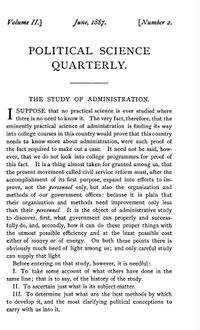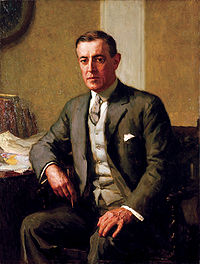The Study Of Administration
 From Conservapedia
From Conservapedia | The Study of Administration | |
|---|---|
 Wilson's most important academic work[1] | |
| Author | Woodrow Wilson |
| Year Published | 1887 |
| Language | English |
The Study of Administration is a groundbreaking article written by future president Woodrow Wilson in which he argues for the centralization of administration. Signaling the birth of the Administrative State, Wilson argued for the necessity of administrators separated from the back and forth of elections and politics.[2]
Contents
Separation from Politics[edit]
Wilson believed that the purity of the bureaucracy could be separated from the muck of the political process. He wrote:
The field of administration is a field of business. It is removed from the hurry and strife of politics; it at most points stands apart even from the debatable ground of constitutional study. It is a part of political life only as the methods of the counting house are a part of the life of society; only as machinery is part of the manufactured product. But it is, at the same time, raised very far above the dull level of mere technical detail by the fact that through its greater principles it is directly connected with the lasting maxims of political wisdom, the permanent truths of political progress. The object of administrative study is to rescue executive methods from the confusion and costliness of empirical experiment and set them upon foundations laid deep in stable principle.[3]
For Wilson, administration was at the height of clarity and reason, whereas politics is far below, stuck in the "dull level of technical detail". In addition, administration transcends the "lasting maxims of political wisdom", of "permanent truths of political progress". This is a direct rejection of the wisdom of the founding generation of Americans who relied heavily upon "unalienable rights". Wilson would later be more direct, when telling a crowd of listeners "do not repeat the preface" of the Declaration of Independence.[4] In addition, he wrote:
Self-government does not consist in having a hand in everything, any more than housekeeping consists necessarily in cooking dinner with one's own hands. The cook must be trusted with a large discretion as to the management of the fires and the ovens.[3]
By separating administration from politics, the people have no direct say in how their government is run. Furthermore, by empowering "the cooks" with a "large discretion", administration(or the bureaucracy) necessarily reaches the inevitable end result of being able to create policy, rules, and regulation, without any input at all from the voting public.
This transcends self-government and heralds a state of Bureaucratic Despotism.
Responsible Power[edit]
Wilson believed that power could be amassed responsibly with no harm to the citizens. In addition, he believed that centralizing power would actually enhance the ability of the public to achieve accountability with respect to public officials. He wrote:
Public attention must be easily directed, in each case of good or bad administration, to just the man deserving of praise or blame. There is no danger in power, if only it be not irresponsible. If it be divided, dealt out in shares to many, it is obscured; and if it be obscured, it is made irresponsible. But if it be centred in heads of the service and in heads of branches of the service, it is easily watched and brought to book.[3]
Most importantly, Wilson believed above all in the purity of administration. That is why he directed citizens to never be critical of administration; instead, focus solely on "the man deserving of praise or blame".
Criticism[edit]
Conservatives studying the history of Progressivism and trying to answer the question of "how did we get here?", are highly critical of Wilson's views of administration and what it came to be in the 20th and 21st centuries.
Ronald J. Pestritto, a professor at Hillsdale College, wrote that "Wilson's separation of politics and administration becomes, then, a means for maintaining the democratic veneer of popular government while giving to unelected administrators the wide berth they need to manage the complex business of national progress."[5]
See also[edit]
References[edit]
- ↑ The American State from the Civil War to the New Deal: The Twilight of Constitutionalism and the Triumph of Progressivism, The Administrative State
- ↑ Woodrow Wilson on Administration
- ↑ 3.0 3.1 3.2 Study of Administration, Section II
- ↑ Woodrow Wilson and the Rejection of the Founders' Principles
- ↑ Woodrow Wilson and the Roots of Modern Liberalism
External links[edit]
- The Study of Administration, Full Text (June, 1887)
Categories: [Bureaucracy]
↧ Download as ZWI file | Last modified: 02/07/2023 07:58:07 | 19 views
☰ Source: https://www.conservapedia.com/The_Study_of_Administration | License: CC BY-SA 3.0
 ZWI signed:
ZWI signed:
 KSF
KSF